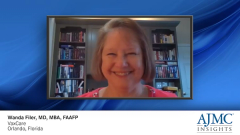
Navigating the RSV Treatment Landscape and Associated Financial Considerations
Financial burden associated with RSV treatment is explored by a medical expert.
Wanda Filer, MD, MBA, FAAFP: Other than supportive care, IV [intravenous] fluids if needed, maintaining hydration, and treatment for fever if it’s there, there’s not a lot of treatment for RSV [respiratory syncytial virus]. We have antivirals for COVID-19 and the flu, but we don’t have antivirals for RSV, so it’s supportive care. Even when patients are in the hospital, it’s often for supportive care to get them through the worst phases of the illness. There’s an antibody that’s been on the market for years for children. Unfortunately, it requires multiple doses. It doesn’t last a long time. This new option coming out for pediatrics, which is 1 dose in the season, is hopefully a real step-up in terms of how we’ll be able to protect these children.
The new monoclonal antibody nirsevimab is a 1-time dose. It’s for the pediatric patient in the first year of life, and it’s a 1-time dose that will carry throughout the season. The existing monoclonal antibody [palivizumab] is, I believe, 5 doses. It doesn’t last as long, so you need to repeat the dose. That’s typically given only to children at the highest risk: children who have underlying lung disease or are very premature. But nirsevimab is for all children. It won’t be only for those at the highest risk. Our expectation is that it will be in the routine schedule to immunize all children and protect them through that very vulnerable first RSV season.
Nirsevimab will be given as a half dose for lower-weight infants. [When the infant is] about 11 lb, nirsevimab will be given as a full dose.
It’s going to be important for all payers, including Medicaid, to make sure that there’s access and payment for vaccines and therapies as soon as they’re available. One of the concerns is that there’s going to be a lag time if we get approval for vaccines and these monoclonal antibodies and then wait for MMWR [Morbidity and Mortality Weekly Report] to publish it before the payer begins to pay for them. It may not get published until August or September, but that’s when we should be giving doses. It’s going to be important for payers—for their patients, for their covered lives, and for their own bottom line—to pay for it immediately. Medicaid patients have a particular challenge because they often have a lot of challenges around social determinants of health. They’re at high risk for complications of RSV, and we need to make sure Medicaid covers this appropriately, both the vaccine and the administration fee.
It’s the same situation for vaccines for children. The monoclonal antibody for children is going to be very important for VFC [Vaccines for Children] to pick it up. We’ve got an equitable distribution for children who are on VFC, as well as those who have commercial insurance.
Transcript edited for clarity.
Newsletter
Stay ahead of policy, cost, and value—subscribe to AJMC for expert insights at the intersection of clinical care and health economics.










